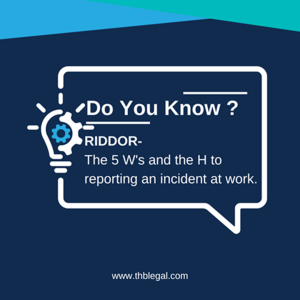Inheritance tax is changing in 2026
What farming families and business owners need to know If you own a farm,...- 11 February 2026
Posted: 07 December 2022
RIDDOR stands for the Reporting of Injuries, Diseases and Dangerous Occurrences Regulations 2013, which places a duty upon employers, the self-employed and people in control of work premises (the Responsible Person) to report certain serious workplace accidents, occupational diseases and specified dangerous occurrences. Regulation 3 of RIDDOR 2013 outlines who is the responsible person.
No matter what your role within a workplace is, it is important to know exactly what duties the regulations require so that you know what to do in the event of an accident.
If you are self-employed and working on someone else’s premises the person in control of that premises will be responsible for reporting incidents that the regulations require to be reported. However, if you have an incident whilst working on your own premises or in domestic premises or if a doctor tells you, you have a work-related condition you are required to report it.
It is not appropriate for members of the public, injured persons, or other people who do not hold duties under RIDDOR to report incidents under this system. If you are an employee, any incidents should be reported to your employer to report if necessary.

A RIDDOR report is required when the incident is work related or if it results in an injury of a type which is reportable.
Regulation 6 of RIDDOR 2013 states all deaths of both workers and non-workers arising from a work-related incident must be reported. Note also where death occurs within one year as a result of a reportable injury this must report.
Regulation 4 specifies non-fatal injuries that must be reported by the Responsible Person these are:
Diseases which have been caused or made worse as a result of work must be reported. This included diagnosis of:
Another important aspect of the regulations that can be overlooked is the importance of record keeping.
Regulation 5 of RIDDOR 2013 states where any person not at work suffers a work-related accident where they are taken to hospital for treatment straight from the site of the incident of suffers a specified injury on hospital premises, the person responsible must follow the reporting procedure.
Regulation 12 of RIDDOR 2013 requires the responsible person as outlined in regulation 3 to keep a record of any reportable injury, any injury under regulations 4,5 and 6 and any injury which results in the injured person being unable to carry out their normal work for more than 3 days. The record must be kept for 3 years from the date in which it was made, this may be kept in the form of an accident book.
Schedule 1 part 2 of RIDDOR 2013 Provides what the records of accidents and diagnosed disease must include. This includes:
When submitting a RIDDOR you will be able to download a copy of the submission to keep for your records, it is advisable to do so.
Schedule 1 of RIDDOR 2013 requires the responsible person to notify the relevant authority of the reportable incident by the quickest means and without delay; this is not applicable where a self-employed person is injured at a premises owned or occupied by them. Schedule 1 also requires the responsible person to send a report of the incident within 10 days; this requirement applies to self employed persons alike.
Incidents which result in an over-seven-day incapacitation to work must be reported, this does not include the day of the incident but does include weekends and rest days. The incident must be reported as soon as practicable but must be reported within 15 days of the accident.
Incidents which result in an over-three-day incapacitation of a worker must be recorded as mentioned above but may not reported.
Incidents can be reported online via the Health and Safety Executive website at https://www.hse.gov.uk/riddor/report.htm . Fatal and specified incidents can also be reported by telephone at the incident contact centre on 0345 300 9923 (opening hours Monday to Friday 8.30 am to 5 pm).
The purpose of reporting is to warn the relevant authorities that an incident has occurred so that they may review the circumstances and if necessary, attend the scene of the incident. Attendance at the scene may be necessary where the scene of the incident needs to be preserved or when the relevant authority needs to assist in ensuring the relevant health and safety measure are in place to prevent further risk to health and safety.
Failing to report an incident will result in you being guilty of a criminal offence and you may be taken to court. Not knowing proper procedure for RIDDOR is not a defence so, it is important that you comply with the regulations to prevent investigation and prosecution from the Health and Safety executive or other authority.
Please call THB Solicitors on 01245 493 959 and ask to speak to one of our regulatory solicitors, email or complete our online form. We would be happy to answer any questions you may have and help you follow your duties under RIDDOR.
- 11 February 2026
- 09 February 2026
- 07 February 2026